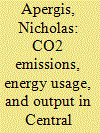|
|
|
Sort Order |
|
|
|
Items / Page
|
|
|
|
|
|
|
| Srl | Item |
| 1 |
ID:
097502


|
|
|
|
|
| Publication |
2010.
|
| Summary/Abstract |
This short communication examines whether or not U.S. natural gas consumption follows a stationary process. Unlike previous research that has focused on regional country or industrial sector-based panel studies, this study undertakes a sub-national investigation of natural gas consumption for the 50 U.S. states. Levin et al. (2002), Im et al. (2003), Maddala and Wu (1999), and Hadri (2000) panel unit root and stationarity tests reveal that natural gas consumption is integrated of order one. However, once allowance is made for endogenously determined structural breaks, the Carrion-i-Silvestre et al. (2005), Im et al. (2005), and Westerlund (2005) panel unit root and stationarity tests indicate that natural gas consumption is integrated of order zero. Discussion of the structural breaks is briefly surveyed in relation to the natural gas industry's response to legislative actions.
|
|
|
|
|
|
|
|
|
|
|
|
|
|
|
|
| 2 |
ID:
176771


|
|
|
|
|
| Summary/Abstract |
With rapidly expanding real GDP in Vietnam, it is anticipated that the Vietnamese energy production will increase to meet its rising energy consumption. An important corollary is that pollution will also rise since the energy sector is considered a big polluter in the developing world. This paper brings two important insights to this literature: first and foremost, this paper seeks to establish if any behavioural biases of policy makers have clouded the decision to adopt suitable energy technologies and policies in Vietnam with far-reaching consequences for sustainability in the region. Secondly, in order to detect behavioural biases, it considers the asymmetric effects of increases vis-à-vis decreases in regressors by using the non-linear autoregressive distributed lags (NARDL) models, to examine how such increases or decreases really impact on pollution in Vietnam. Using annual data from 1982 to 2015, the analysis finds that the long-run relationships between pollution, energy use and oil prices have been characterised by non-linear and asymmetric interlinkages to indicate hidden cointegration. We further argue that such hidden cointegration can signal important behavioural biases in (energy) policy-making.
|
|
|
|
|
|
|
|
|
|
|
|
|
|
|
|
| 3 |
ID:
089005


|
|
|
|
|
| Publication |
2009.
|
| Summary/Abstract |
This study extends the recent work of Ang (2007) [Ang, J.B., 2007. CO2 emissions, energy consumption, and output in France. Energy Policy 35, 4772-4778] in examining the causal relationship between carbon dioxide emissions, energy consumption, and output within a panel vector error correction model for six Central American countries over the period 1971-2004. In long-run equilibrium energy consumption has a positive and statistically significant impact on emissions while real output exhibits the inverted U-shape pattern associated with the Environmental Kuznets Curve (EKC) hypothesis. The short-run dynamics indicate unidirectional causality from energy consumption and real output, respectively, to emissions along with bidirectional causality between energy consumption and real output. In the long-run there appears to be bidirectional causality between energy consumption and emissions.
|
|
|
|
|
|
|
|
|
|
|
|
|
|
|
|
| 4 |
ID:
094238


|
|
|
|
|
| Publication |
2010.
|
| Summary/Abstract |
This study examines the relationship between coal consumption and economic growth for 25 OECD countries within a multivariate panel framework over period 1980-2005. The Larsson et al. (2001) panel cointegration test indicates there is a long-run equilibrium relationship between real GDP, coal consumption, real gross fixed capital formation, and the labor force. The respective coefficients for real gross fixed capital formation and the labor force are positive and statistically significant whereas the coefficient for coal consumption is negative and statistically significant. The results of the panel vector error correction model reveal bidirectional causality between coal consumption and economic growth in both the short- and long-run; however, the bidirectional causality in the short-run is negative.
|
|
|
|
|
|
|
|
|
|
|
|
|
|
|
|
| 5 |
ID:
162248


|
|
|
|
|
| Summary/Abstract |
We use the k-th-order nonparametric causality test at monthly frequency over the period of 1985:1 to 2016:06 to analyze whether geopolitical risks can predict movements in stock returns and volatility of 24 global defense firms. The nonparametric approach controls for the existing misspecification of a linear framework of causality, and hence, the mild evidence of causality obtained under the standard Granger tests cannot be relied upon. When we apply the nonparametric test, we find that there is no evidence of predictability of stock returns of these defense companies emanating from the geopolitical risk measure. However, the geopolitical risk index does predict realized volatility in 50% of the companies. Our results indicate that while global geopolitical events over a period of time is less likely to predict returns, such global risks are more inclined in affecting future risk profile of defense firms.
|
|
|
|
|
|
|
|
|
|
|
|
|
|
|
|
| 6 |
ID:
093544


|
|
|
|
|
| Publication |
2010.
|
| Summary/Abstract |
This study examines the causal relationship between carbon dioxide emissions, energy consumption, and real output within a panel vector error correction model for eleven countries of the Commonwealth of Independent States over the period 1992-2004. In the long-run, energy consumption has a positive and statistically significant impact on carbon dioxide emissions while real output follows an inverted U-shape pattern associated with the Environmental Kuznets Curve (EKC) hypothesis. The short-run dynamics indicate unidirectional causality from energy consumption and real output, respectively, to carbon dioxide emissions along with bidirectional causality between energy consumption and real output. In the long-run there appears to be bidirectional causality between energy consumption and carbon dioxide emissions.
|
|
|
|
|
|
|
|
|
|
|
|
|
|
|
|
| 7 |
ID:
166366


|
|
|
|
|
| Summary/Abstract |
Fracking drilling has opened a discussion on the role of technological developments in economies engaged in shale oil and gas formations. Oil and natural gas production opened new possibilities for employment benefits and housing prices decreases. This paper explores, for the first time, the impact of fracking on housing prices across Oklahoma's counties, spanning the period 2000–2015. Through panel methods, the findings show a positive effect on housing prices, while this positive effect gains statistical significance only over the period after the 2006 fracking boom. The results survive a robustness check that explicitly considers distance and groundwater-dependency issues.
|
|
|
|
|
|
|
|
|
|
|
|
|
|
|
|
| 8 |
ID:
109429


|
|
|
|
|
| Publication |
2011.
|
| Summary/Abstract |
This paper investigates the integration properties of disaggregated solar, geothermal and biomass energy consumption in the U.S. The analysis is performed for the 1989-2009 period and covers all sectors which use these types of energy, i.e., transportation, residence, industrial, electric power and commercial. The results suggest that there are differences in the order of integration depending on both the type of energy and the sector involved. Moreover, the inclusion of structural breaks traced from the regulatory changes for these energy types seem to affect the order of integration for each series.
|
|
|
|
|
|
|
|
|
|
|
|
|
|
|
|
| 9 |
ID:
093546


|
|
|
|
|
| Publication |
2010.
|
| Summary/Abstract |
This study examines the relationship between renewable energy consumption and economic growth for a panel of twenty OECD countries over the period 1985-2005 within a multivariate framework. Given the relatively short span of the time series data, a panel cointegration and error correction model is employed to infer the causal relationship. The heterogeneous panel cointegration test reveals a long-run equilibrium relationship between real GDP, renewable energy consumption, real gross fixed capital formation, and the labor force with the respective coefficients positive and statistically significant. The Granger-causality results indicate bidirectional causality between renewable energy consumption and economic growth in both the short- and long-run.
|
|
|
|
|
|
|
|
|
|
|
|
|
|
|
|
| 10 |
ID:
180179


|
|
|
|
|
| Summary/Abstract |
The essential role of renewable energy in mitigating the negative consequences of climate change has led to a growing body of literature that has examined the determinants of renewable energy consumption. Most of the existing studies focused on the macroeconomic, environmental, institutional, and energy-related determinants of renewable energy consumption and neglected the potential role of partisan polarization. The adverse effects of party polarization have been well documented by the literature, but the impact of party polarization on renewable energy consumption has not been examined. To fill this existing gap, this study explicitly explores the association between renewable energy consumption and partisan polarization across 25 European Union countries, spanning the period 2003–2017. The findings document that party polarization is negatively associated with renewable energy consumption after accounting for an extensive set of macroeconomic, environmental, institutional, and energy-related determinants and the use of a different set of estimation methodologies. The paper's findings show another adverse effect of party polarization by demonstrating its negative impact on renewable energy consumption.
|
|
|
|
|
|
|
|
|
|
|
|
|
|
|
|
| 11 |
ID:
177389


|
|
|
|
|
| Summary/Abstract |
This empirical study significantly contributes in building emerging literature by investigating the impact of US partisan conflict uncertainty on international oil prices. It models oil prices through non-linear Quantile Autoregressive Distributed Lag (QARDL) methods in order to consider potential (non-linear) asymmetric effects of partisan political uncertainty on oil prices. The empirical results clearly document the asymmetric (non-linear) impact of partisan conflict uncertainty on international oil prices, which has been in contrast to the linear case. The findings also expose that the transmission mechanism of partisan political uncertainty to oil prices is validated through the economic growth channel. The empirical findings contribute to existing research by assisting investors in the oil industry with risk identification, analysis, and mitigation. The results can assist in discovering the links between US political risk and oil markets, determining an important element of political risk factors facing investors who want to participate in the oil industry.
|
|
|
|
|
|
|
|
|
|
|
|
|
|
|
|
|
|
|
|
|